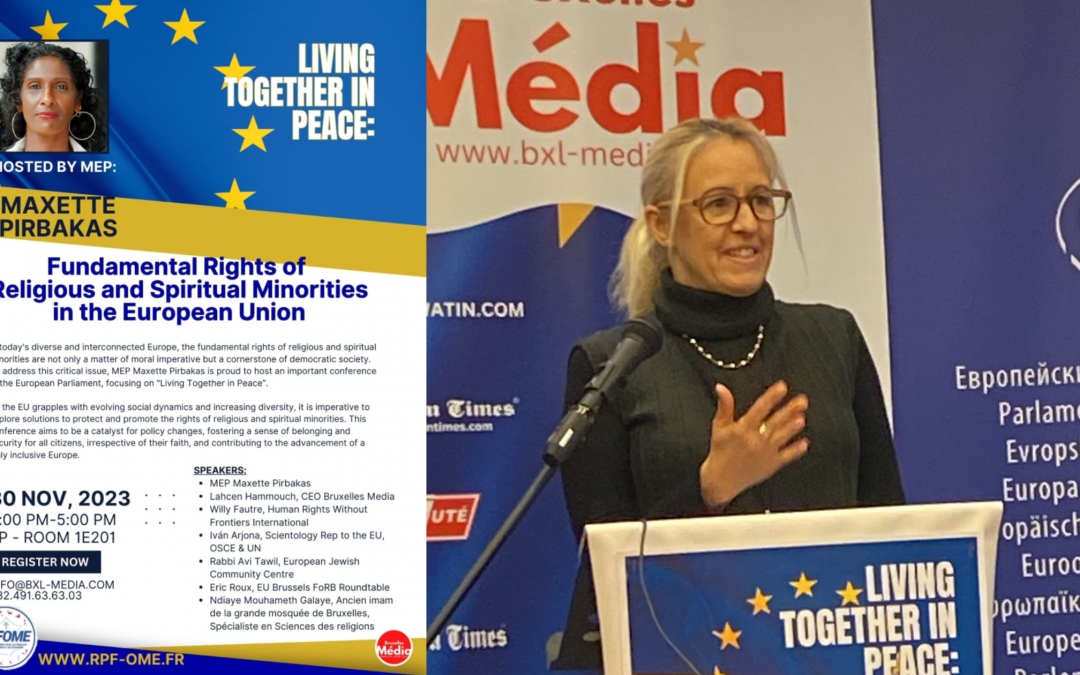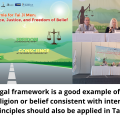Christine Mirre, Director of CAP Liberté de Conscience a French NGO with UN consultative status that has been defending religious and spiritual minorities for more than 20 years.
As French, I’d like to give some specifics on the unique case of France.
The French government has established a system of control over these minorities that is unique in Europe and that leads to serious violations by the State of the principles of freedom of religion or belief, equality of French citizens before the national institutions, and fraternity, by dividing citizens according to whether or not they belong to a recognized religious or belief minority, and by creating a climate of suspicion and sometimes even hatred towards non-traditional beliefs, leading to a deterioration in the quality of peaceful living together.
In France, members of religious or spiritual minorities are treated differently, particularly by the judicial authorities.
In fact, there is a legal system specifically adapted to the members of these minorities, although the French legal arsenal at the administrative, civil and criminal levels is very well endowed and allows for justice.
When a member of one of these minorities comes into contact with the law, he or she enters a well-oiled, well-regulated circuit in which he or she is condemned before being judged.
Despite decades of being denounced by European and international bodies, France continues to violate international and European treaties on religious freedom.
To illustrate this point, on November 15, a draft law “to reinforce the fight against sectarian drifts” was presented to the Council of Ministers and immediately sent to the Senate’s legal commission under an accelerated procedure.
It will be discussed in the plenary session of the Senate on December 19. Consisting of 7 articles, it would, if enacted into law, seriously undermine the fundamental principles of freedom of conscience, religion and belief and raise real problems of conventionality and conformity with the French Constitution and international law on fundamental freedoms.
– Article 1 of the bill creates a new offense in the Penal Code of “placing or keeping a person in a state of mental or physical submission”. Psychological submission” (or mind control) is a pseudo-scientific concept, repeatedly rejected by scientists throughout the world, whose application in criminal law, particularly in the religious and spiritual sphere, constitutes a threat to democracy and fundamental freedoms. The ECHR (European Court of Human Rights) itself has already ruled that “there is no generally accepted and scientific definition of what constitutes ‘mind control'”.
The adoption of this article would lead to the criminalization of many religious practices that could easily be considered as “techniques capable of altering judgment” leading to psychological subjugation. It would also lead to a worrying trend in criminal law, allowing psychiatrists to interpret vague legal definitions, since it would ultimately be the appointed psychiatrist who would be called upon to decide on the validity of a religious or spiritual practice and the validity of a follower’s consent to a particular belief and practice.
– Article 3 of the draft law would allow associations hostile to minority religions, some of which may be fully funded by the state and known for their discriminatory practices against religious minorities, to act as civil parties (plaintiffs) in lawsuits that would otherwise not concern them at all, thus seriously undermining the right to a fair trial guaranteed by Article 6 of the European Convention on Human Rights.
– Article 4 creates, against the advice of the Conseil d’Etat (France’s highest administrative court, which also advises the government on draft legislation), the offense of “provocation to abandon or refrain from undergoing therapeutic or prophylactic medical treatment”. The Conseil d’Etat considered that this article would allow “the criminalization of challenges to the current state of therapeutic practices”, thus endangering “the freedom of scientific debate and the role of whistleblowers”.
– Article 6 is intended to allow MIVILUDES (Interministerial Mission of Vigilance and Combat against Cultic Deviances, a French governmental body attached to the Ministry of the Interior, also known for its intolerance towards minorities) to be consulted by prosecutors or courts in the context of criminal proceedings.
It is of particular concern that this law is being proposed at this time, when the social and political climate in France makes it difficult to oppose such legislation, as its proponents are pilloried in the media as “anti-sects” or “apologists for sects”, without any regard for the fundamental principles of freedom of religion or belief.
This proposed law poses a significant threat to fundamental freedoms and may lead to the unjust criminalization of religious practices.




